Texte paru dans: / Appeared in:
*

GRAMOPHONE (12/2014)
Pour s'abonner /
Subscription information
Erato
WMI4624055

Code-barres / Barcode : 0825646240555
Consultez toutes les évaluations recensées pour ce cd
~~~~ Reach all the evaluations located for this CD
Reviewer:
David
Vickers
Emmanuelle Haïm plumps for a neatly convenient foursoloist version presented in the main text of John Tobin’s Bärenreiter edition. This comes close to matching what Handel did in 1752, but more significantly means we get the best versions of the numbers for which variant settings exist. Therefore, Tim Mead gives an articulately shaded performance of the superior alto setting of ‘But who may abide the day of his coming’ (written for the castrato Guadagni in 1750), Lucy Crowe displays her brilliant semiquaver flourishes in the reset ‘Rejoice greatly’ that replaced the 6/8 jig version sometime in the mid1740s, and we hear the chorus version of ‘Their sound is gone out’ (perhaps one of the measures Handel took to appease the disappointed librettist Charles Jennens in 1745). We also hear the duet version of ‘He shall feed his flock’, sung sweetly by Mead and Crowe, with its Corellian pastoral-style strings paced and weighted perfectly by Haïm. She has also opted for longer versions of music Handel later abridged, such as the more extended thrills of ‘Why do the nations rage so furiously together’ (sung with perplexed inquisitiveness and suave authority by Christopher Purves, and with its basso continuo lines imaginatively detailed).
The delivery of the choruses is
crisply focused and shaped impressively; Haïm sensibly opts to hire top-notch
English freelancers organised by ‘consultant’ David Clegg and chorusmaster David
Bates. There are a small number of occasions when Haïm could have let the music
speak more naturally for itself, such as the mannered treatment of violin
figures when the choir sings ‘wonderful, counsellor’ in ‘For unto us a child is
born’, and the unconvincing loud-soft pattern adopted for the choral
exclamations at the outset of ‘Hallelujah’. Nevertheless, the fusion of dramatic
mood, orchestral texture and an inspired soloist often pays off handsomely, such
as Purves’s gorgeously serene ‘For behold, darkness shall cover the earth’ (no
mere bluster here), Mead’s cathartic embellishments in the da capo of ‘He was
despised’, Andrew Staples’s tastefully ornamented ‘Thy rebuke hath broken his
heart’, and Crowe’s fervent and radiant ‘I know that my Redeemer liveth’.
Fermer la fenêtre/Close window
Cliquez l'un ou l'autre
bouton pour découvrir bien d'autres critiques de CD
Click either button for many other reviews


